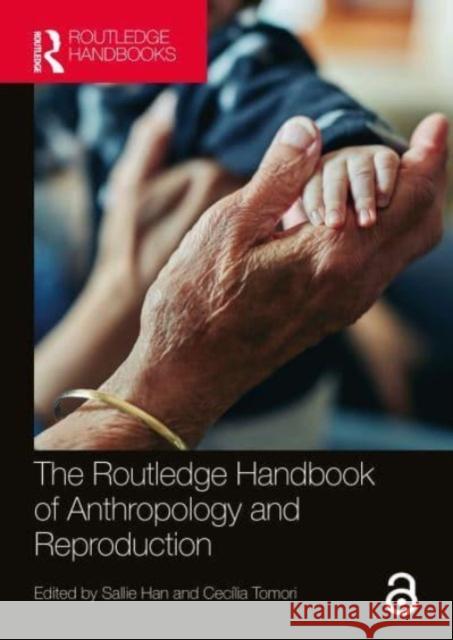The Routledge Handbook of Anthropology and Reproduction » książka



The Routledge Handbook of Anthropology and Reproduction
ISBN-13: 9781032106663 / Miękka / 2023 / 652 str.
The Routledge Handbook of Anthropology and Reproduction
ISBN-13: 9781032106663 / Miękka / 2023 / 652 str.
(netto: 217,40 VAT: 5%)
Najniższa cena z 30 dni: 212,81
ok. 16-18 dni roboczych.
Darmowa dostawa!
This book is a comprehensive overview of the topics, approaches, and trajectories in the anthropological study of human reproduction.
Wydanie ilustrowane
"This book expertly guides us through the intricacies of reproduction as a complex entanglement of biocultural, biographical and historically situated practices, in which relationships of unequal power and violence, as well as care and kinship are forged. The editors have showcased the astonishing breadth of topics that are centred on reproduction, from socio-cultural, evolutionary, linguistic, political, medical, technological and intersectional perspectives. The book will appeal to students and scholars at all levels with an interest in reproduction and I highly recommend it – even established experts will encounter new knowledge and will be inspired to broaden their thinking about reproduction beyond the confines of their own disciplinary imperatives and experiences. The book also has much to offer those who work to set policy and practices which relate, directly and indirectly, to reproduction. If clinicians, legislators, as well as those who determine public health policy, were to engage with the evidence and arguments so cogently presented in this book then perhaps the subject of reproduction could take its rightful place at the core of our everyday values, practices, and human rights." - Rebecca Gowland in Childhood in the Past
Introduction Part I Opening conversations in reproduction 1. Conceiving Reproduction in Biological Anthropology 2. Developmental Origins of Health and Disease: Evidence, Proposed Mechanisms, and Ideas for Future Applications 3. Men and Reproduction: Perspectives from Biological Anthropology 4. Conceiving of Reproduction in Archaeology Part II Governance, stratification, justice, and freedom 5. Reproduction and the State 6. The Necropolitics of Reproduction: Racism, Resistance, and the Sojourner Syndrome in the Age of the Movement for Black Lives 7. Reproductive Governance in Practice: A Comparison of State-Provided Reproductive Health Care in Cuba and the United States 8. Reproduction through Revolution: Maoist Women’s Struggle for Equity in Post-Development Nepal 9. Policy, Governance, Practice: Global Perspectives on Abortion 10. Sterile Choices: Racialized Women, Reproductive Freedom, and Social Justice Part III Making fertility 11. Menstruation: Causes, Consequences, and Context 12. Menstruation: Sociocultural Perspectives 13. Infertility, In Vitro Fertilization, and Fertility Preservation: Global Perspectives 14. Global IVF and Local Practices: The Case of Ghana 15. Eggs 16. Surrogacy Part IV Queering reproduction 17. The Racial Contours of Queer Reproduction 18. Invisible Hands: The Reproductivities of Queer(ing) and Race(ing) Gynecology Part V Made and unmade: Personhood and reproduction 19. "Personhood" in the Anthropology of Reproduction 20. Prenatal Screening and Diagnosis 21. Navigating Reproductive Losses 22. Reproduction in the Past: A Bioarchaeological Exploration of the Fetus and Its Significance Part VI Pregnancy 23. Pregnancy and the Anthropology of Reproduction 24. Bringing Language into the Anthropology of Reproduction: The Text and Talk of Pregnancy 25. From Couvade to "Men’s Involvement": Sociocultural Perspectives of Expectant Fatherhood Part VII Birth 26. The Obstetrical Dilemma Revisited--Revisited 27. There Is No Evolutionary "Obstetrical Dilemma" 28. Midwifery in Cross-Cultural Perspectives 29. Doulas: Negotiating Boundaries in Birth 30. Rituals and Rites of Childbirth across Cultures 31. Making Dignified Care the Norm: Examining Obstetric Violence and Reproductive Justice in Kenya 32. Maternal Mortality Part VIII Postpartum and infant care 33. Making Space for Lactation in the Anthropology of Reproduction 34. The Bioarchaeology of Infant Feeding 35. Biocultural Perspectives on Infant Sleep Part IX Care as reproducing kinship 36. Menopause 37. The Shifting Role of Grandmothers in Global Reproduction Strategies 38. Alloparenting: Evolutionary Origins and Contemporary Significance of Cooperative Childrearing as a Key Feature of Human Reproduction 39. Adoption and Fostering Glossary
Sallie Han is Professor of Anthropology at SUNY Oneonta, USA. She is the author of Pregnancy in Practice: Expectation and Experience in the Contemporary US (2013) and co-editor of The Anthropology of the Fetus: Biology, Culture, and Society (2018).
Cecília Tomori is Associate Professor and Director of Global Public Health and Community Health at Johns Hopkins University School of Nursing, USA. She is the author of Nighttime Breastfeeding: An American Cultural Dilemma (2014) and co-editor of Breastfeeding: New Anthropological Approaches (2018).
1997-2026 DolnySlask.com Agencja Internetowa
KrainaKsiazek.PL - Księgarnia Internetowa









